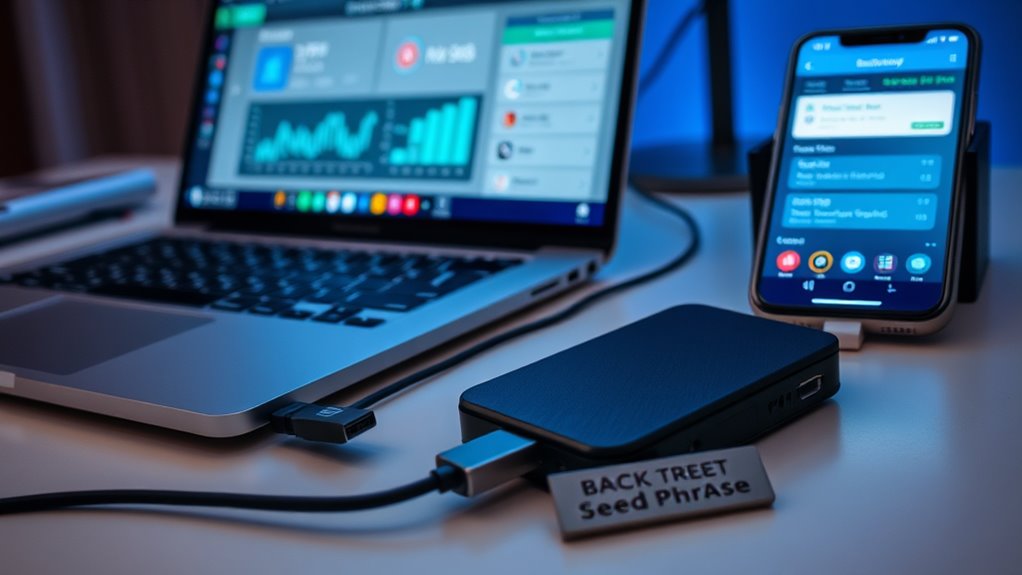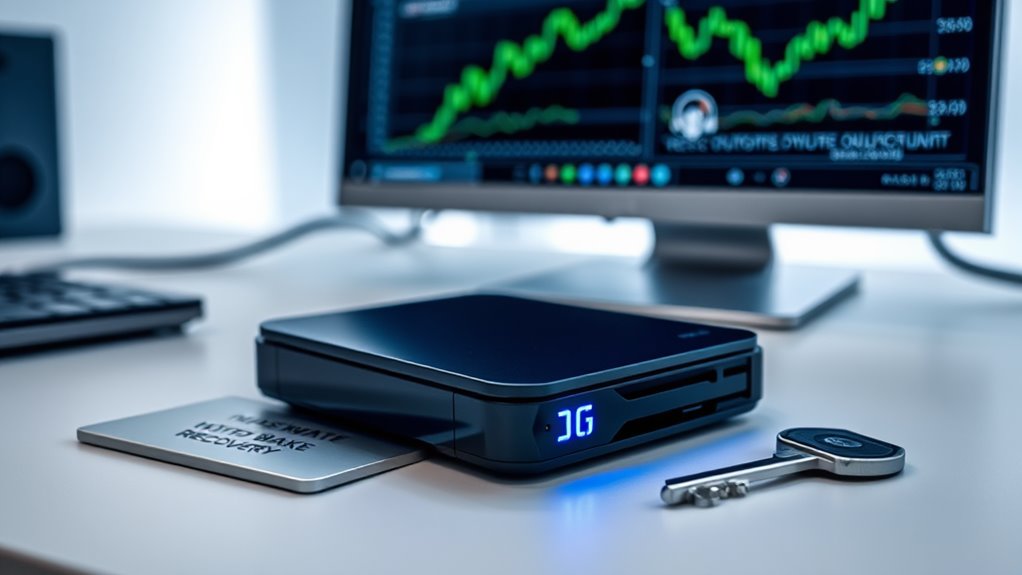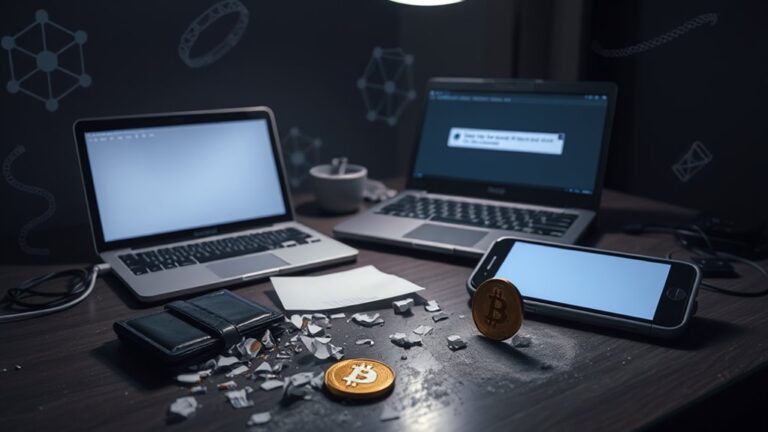Digital Wallets: Secure Crypto Management
Note: This post may contain affiliate links, and we may earn a commission (with No additional cost for you) if you purchase via our link. See our disclosure for more info. The gold and crypto world is constantly changing. This is not financial, investment, legal, or professional advice. So, please verify the information on the gold and cryptocurrency provider’s websites.
Digital wallets are essential for managing cryptocurrencies securely. There are hot wallets—convenient but risky—and cold wallets that boast strong security. Don't confuse paper wallets with good idea; they're like writing your PIN on a napkin. Remember, always protect your private keys. Use strong passwords and two-factor authentication. Crypto can be a wild ride, with market swings and hacker threats lurking. Want to know more about how to protect your assets? Well, there's more to uncover.

In a world where digital currency rules the roost, managing crypto assets can feel like maneuvering through a minefield. Hot wallets? Sure, they're convenient, always online, but good luck if a hacker gets wind of your keys. It's like leaving your front door wide open and hoping nobody walks in.
Then there are cold wallets, the introverts of the crypto world. Hardware wallets like Ledger or Trezor keep your private keys offline, so they're safer but not exactly user-friendly for everyday transactions. Ledger's impressive Secure Element chip provides exceptional resistance against advanced attacks, making it a top choice for serious crypto holders. And don't even get started on paper wallets. Writing down your keys on a piece of paper? That's a recipe for disaster if the wind blows too hard.
Let's not forget multisig wallets, the “I'll never do it alone” types. They require multiple keys for transactions, so you'll need to gather your friends for every purchase. But hey, safety in numbers, right?
Security features are a must, too. Encryption and tokenization help keep payment details under wraps. Private keys? Never share those! Store backups in a safe or a vault – your mom's jewelry box doesn't count. Non-custodial wallets allow users to manage their own wallets through software or hardware, placing the responsibility for security on the wallet owner. Strong cybersecurity measures are necessary for safeguarding cryptocurrency transactions, making it essential to implement robust protective strategies.
Then there's the whole HD wallet situation. A master seed generates keys for all your crypto needs. It's nifty until you realize you've reused addresses. Hello, transaction correlation!
AI is swooping in, too. It's like having a digital bodyguard detecting fraud and optimizing fees while you sleep. Sounds fancy, but it's only as good as the algorithms behind it.
And inheritance? Yeah, that's a thing. Legacy contacts let you pass on your assets, avoiding the nightmare of legal paperwork. Just don't forget about quantum-resistant backups. Because who knows what the future holds?
Frequently Asked Questions
What Types of Cryptocurrencies Can I Store in a Digital Wallet?
Digital wallets can hold a wild mix of cryptocurrencies.
You've got Bitcoin—the heavyweight champ—alongside a bunch of altcoins. Ethereum? Totally in.
And let's not forget ERC-20 tokens like USDC and DAI. Some wallets even juggle multiple blockchains, so you can flaunt your Solana or Avalanche stash.
Basically, if it's crypto, there's probably a wallet out there that'll take it.
Just remember, not every wallet can handle every coin. Pick wisely!
Are Digital Wallets Compatible With All Devices and Platforms?
Not all digital wallets play nice with every device or platform.
Google Wallet? Only for NFC-enabled Androids.
Apple Pay? Exclusive club for iOS users.
Samsung Wallet? Good luck if you don't own a Galaxy.
Then there are hardware wallets, needing specific setups.
Cross-platform wallets can support multiple operating systems, but don't expect mobile trading magic.
It's a mixed bag, really.
Compatibility issues? Yeah, they're a thing.
Welcome to the digital age!
How Do I Recover a Lost Digital Wallet?
Recovering a lost digital wallet? Good luck.
First, try entering that seed phrase into a compatible wallet app. If that fails, dig through your backups—cloud storage, physical notes, whatever.
Lost it all? Consider social recovery options or maybe even Shamir's Secret Sharing if you're fancy.
Hardware wallet users can buy a new device and restore from there. Just don't store your seed phrase online. That's begging for trouble.
Is There a Limit on Transactions Using Digital Wallets?
Yes, digital wallets have transaction limits.
Google Pay caps you at $2,000 per transaction. Apple Cash? A whopping $10,000, if you're feeling fancy.
Verification matters too; unverified users get slapped with lower limits.
Then, there are prepaid wallets; they only let you spend what you've loaded. It's like a budget on steroids.
Each type of wallet has its quirks and caps. So, yeah, spending isn't just a free-for-all.
Can I Use a Digital Wallet for Traditional Currency Transactions?
Sure, you can use a digital wallet for traditional currency transactions.
It's not just for hipsters or tech nerds. You can send money to friends or pay for your morning coffee. It's like magic, but with a smartphone. No need to fumble with cash or cards. Just tap, and boom! Transactions happen in real-time.
But don't forget the security stuff—biometric locks and encryption keep your money safe. Who doesn't love that?











